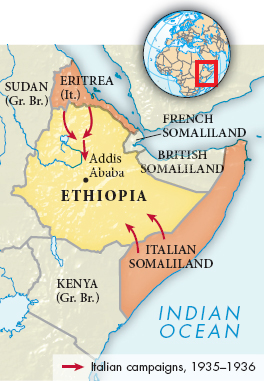The Regime in Action
Mussolini became prime minister in 1922, but he moved cautiously in his first two years in office to establish control of the government. Once in control, however, he moved rapidly to establish a one-
Mussolini’s Fascist Party drew support from broad sectors of the population, in large part because he was willing to compromise with the traditional elites that controlled the army, the economy, and the state. He left big business to regulate itself, and there was no land reform. Mussolini also drew increasing support from the Catholic Church. In the Lateran Agreement of 1929, he recognized the Vatican as an independent state, and he agreed to give the church significant financial support in return for the pope’s support. Because he was forced to compromise with these conservative elites, Mussolini never established complete totalitarian control.

Mussolini’s government nonetheless proceeded with attempts to bring fascism to Italy. The state engineered popular consent by staging massive rallies and sporting events, creating Fascist youth and women’s movements, and providing new welfare benefits. Fascist propaganda promoted a “cult of the Duce” (leader), portraying Mussolini as a powerful strongman who embodied the best qualities of the Italian people. Like other Fascist regimes, his government was vehemently opposed to liberal feminism and promoted traditional gender roles. Mussolini also gained support by manipulating popular pride in the grand history of the ancient Roman Empire.
Mussolini matched his aggressive rhetoric with military action: Italian armies invaded the African nation of Ethiopia in October 1935. After surprising setbacks at the hands of the poorly armed Ethiopian army, the Italians won in 1936, and Mussolini could proudly declare that Italy again had its empire. Though it shocked international opinion, the war resulted in close ties between Italy and Nazi Germany.
Deeply influenced by Hitler’s example, Mussolini’s government passed a series of anti-
>QUICK REVIEW
What steps did Mussolini take to win the support of conservative groups in Italian society? Why was such support so important to him?